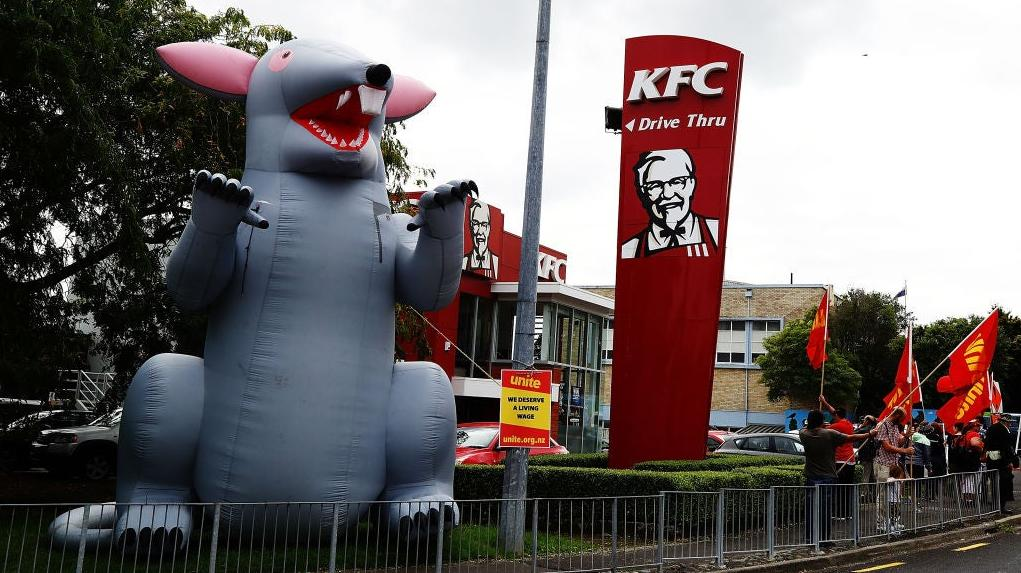How You Can Support Fast Food Unions
Workers at Starbucks and Chipotle are organizing. Here's how to support the fight.
Yesterday, Chipotle workers flooded New York City's Midtown district, picket signs in hand. Per Gothamist, the workers were rallying for higher wages and better scheduling practices, the culmination of a four-day strike against their employer's alleged unsavory treatment of workers. The workers' next step? Unionization, says the Service Employees International Union (SEIU).
Though Chipotle workers haven't yet filed a petition for formal organizing elections, a spokesperson from 32BJ SEIU has high hopes that formal unionization efforts are nigh. This comes as a number of Starbucks locations are formally organizing with SEIU and other fast food unionization efforts are reaching a boiling point. The energy's exciting, but unionizing fast food workers still have a long road ahead as they fight for better working conditions. Here's how you can help.
Educate yourself about the benefits of unions
Unions are a hot-button political issue, and there's a lot of misinformation out there (most of it coming from disgruntled employers). If you're excited about unionization efforts but aren't sure how to support, start by exploring the benefits of unions. Take it from me, a spirited co-chair of my workplace's union: unions serve as a major source of protection and dignity for working Americans. They provide workers with a collective voice, allowing them to advocate for more job security, better pay, and safer working conditions. Once you have a firm grasp on these benefits, you can move forward with confidence as you express your solidarity for organizing workers.
Have an eat-in or sip-in
When you hear about a fast food employer behaving badly, your first instinct might be to boycott their chains—but showing up for organizing workers at those chains can go a long way toward boosting morale. Earlier this week, workers at two Starbucks locations in Chicago's Edgewater neighborhood formally voted to join SEIU. Prior to the vote, local union supporters met at one of the locations for a "sip-in" to express their enthusiasm for the efforts. Group actions like this one are a great way to support unionizing employees, letting workers know that the community is behind them. Throwing some extra cabbage in the tip jar doesn't hurt, either.
Show up for demonstrations
If you're comfortable gathering in groups, consider lending some time to a pro-union demonstration—like yesterday's Chipotle action. "Right now, we have a lot of activity in NYC, particularly related to scheduling issues and workers not getting enough hours, although this effort is open to Chipotle workers everywhere," says SEIU spokesperson Rush Perez. Perez explains that, in 2021, the City of New York sued Chipotle, seeking $150 million in relief for 600,000 alleged violations of the city's Fair Workweek law. "Despite a major administrative complaint from the city, many workers are still reporting violations, including the unlawful reduction of their schedules and failing to offer open shifts to current employees before hiring new workers," Perez says.
With all of that in mind, public demonstrations need all the bodies they can get. Even if you're not connected to the unionization effort, joining the picket line is a great way to show your support. You can also support workers on the ground by bringing snacks or cold drinks.
Show some love online
Sip-ins and picket lines are fabulous, but you can also support unionization efforts remotely. First, many unions use digital petitions to garner public support. You don't have to be a fast food employee or union member to sign these; they're just a way for the union to show their employer that the community supports union activity. (Chipotle workers currently have a petition on the SEIU website.)
Organizing groups also tend to be active on social media. Give the accounts a follow and amplify their messages on your own platforms. Not only will this help garner more petition signatures; it can also generate a feeling of digital solidarity when the going gets tough. Maybe you have a Facebook friend who's interested in organizing their workplace. Maybe a few of your Instagram followers want more information on unions, but are embarrassed to ask. The more you share pro-union activity, the more you can help normalize the idea of worker solidarity in your community.
